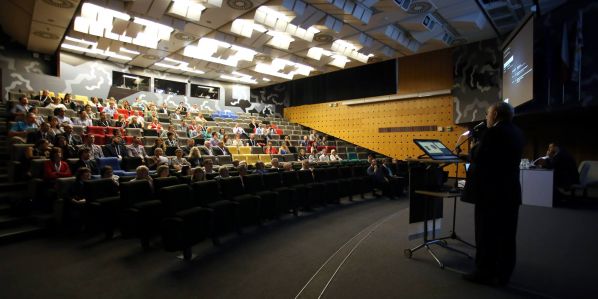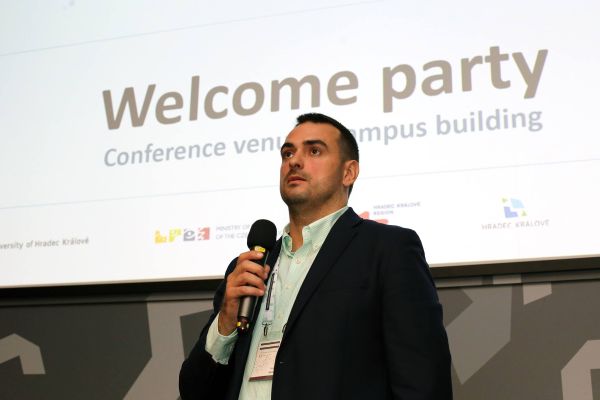
International conventions of scientists dealing with cholinesterase and paraoxonase enzymes which are significant in fighting Alzheimer’s disease as well as for the research of antidotes to poisoning with neuroparalytic substances representing a significant class of military chemical substances are being held every two to three years. This year, the conference will be hosted by a scientific workplace in the Czech Republic for the first time. The thirteenth international meeting on cholinesterase and the seventh conference on paraoxonase will take place on September 9–14 at the University of Hradec Králové. Rector Kamil Kuča is the main organiser of this conference.
One conference and two important enzymes uniting scientists dealing with Alzheimer’s on the one hand, and dealing with the issue of chemical warfare agents such as sarin and novichok on the other.
The history of meetings of cholinesterase experts dates back to 1975, whereas the conferences on paraoxonase have been held since 2004. The last one took place in 2015 in Elche, the south of Spain. The scientific elite from around the world – the USA, Canada, South Korea, Pakistan, Israel, New Zealand, Russia, as well as the UK, Hungary, Poland and Spain – will be participating in this year’s conference.
“Enzyme acetylcholinesterase is the unifying topic of the conference. Nevertheless, we could also say that Alzheimer’s disease and other diseases associated with this enzyme will be discussed in particular. In addition, antidotes, antibodies disturbing the effect of chemical warfare such as sarin, soman, or novichok, which has been recently promoted in media, will also be part of the topics. A specific lecture on novichok is not present on the agenda, nevertheless, we assume it to be discussed in the lobby. I assume so also because our scientific article dealing with this issue will be issued shortly,” mentioned the rector Kamil Kuča.
The assembly hall of the University of Hradec Králové will be the central venue of the conference. All the professional events are purposely situated in a single hall to avoid holding two separate events, with the view to allow each participant to attend all lectures as well as other communications according to their interests.
Besides scientific authorities, students will also take part in the event, postgraduate students in particular. The conference represents an opportunity for them to meet the real elite of this scientific area. They will also be able to participate thanks to the support of the Alzheimer’s foundation which will cover the conference fee for five selected students and five scientists dealing with the disease. Additional five attendees will be allowed to participate thanks to the support of rector of the University of Hradec Králové and the dean of the Faculty of Science of the UHK.
Although the conference focuses on presenting the latest findings in the field of research of both enzymes, it is also about face-to-face meetings of the experts in this research. Besides social evenings that will be a great opportunity for subsequent informal discussions and building cooperation, a concert in the Holy Spirit Cathedral in Hradec Králové will be held for the conference participants and they are also invited to climb the city’s Renaissance White Tower and join the sight-seeing tour. Alternatively, they can decide to visit the Baroque Kuks, chateaux Hrádek u Nechanic or the national stud in Kladruby nad Labem. The conference has been supported also by the city of Hradec Králové, for instance in the form of free tickets for the public transportation for the conference participants or free admission to the White Tower.
A collective volume containing the summary of all presentations in the form of abstracts will be created as the output of the conference. At the same time, selected communications will be published in a special issue of the prestigious journal Chemico-Biological Interactions edited by rector Kamil Kuča and Euogenio Villanova from Spain.
The fact that the conference will take place in Hradec Králové is proving the prestigious position of the scientific group cooperating within the University of Hradec Králové, School of Military Healthcare of the University of Defence and University Hospital in Hradec Králové. The rector Kamil Kuča being linking element.

Hradec Králové has been entrusted with the organisation of the conference thanks to your scientific prestige. Will you take part of the conference agenda with your own lecture?
With regards to my involvement in the organisation of the event I have decided not to take part this time. Nevertheless, I am a co-author of approximately eight articles that will be presented. Not just the Czech, but also within the international author teams. Approximately 15–20 main lectures and other poster communications will be presented this way every day.
Have you found anything extremely interesting in the conference agenda that you are particularly looking forward to?
I am particularly looking forward to meeting my colleagues face to face. All participants of the conference are the real elite and experts in this field. I have reserved this week and I am aware that I am not going to be at home much. I am going to dedicate the time to attending the lectures as well as to subsequent discussions with friends and colleagues. I believe that the cooperation and the future projects will be discussed. And, at the same time, I assume that this event will strengthen the prestige of our scientific group, but also the University of Hradec Králové in general.
Does the University have a workplace dealing with this topic?
The University has the Department of Chemistry at the Faculty of Science. Partially, the Centre for Basic and Applied Research at the Faculty of Informatics and Management deals with the issue. The above-mentioned Department of chemistry within the Faculty of Science led by dr. Kamil Musílek directly deals with the chemical synthesis of new cholinesterase modulators. Their aims include both the development of new medicinal products for Alzheimer’s and research of antidotes intended for the treatment of poisoning with neuroparalytic substances. Alzheimer’s disease is the topic of research also at the Department of Economics of the Faculty of Informatics and Management. For instance, they focus on the analyses of the financial burden of the disease treatment, they calculate costs of placing the patients in medical institutions, and predict the intensity of dissemination of the disease in population.
In your opinion, what study is most beneficial for mankind?
As mentioned above, both conference topics are united by one enzyme, namely acetylcholinesterase. In my opinion, both directions are important and very topical. Alzheimer’s disease is the civil issue. The population grows older and the disease is affecting more and more individuals. Whereby we still do not know of any medication to treat it. On the other hand, there are chemical warfare agents and global terrorism which everyone is terrified of. It is a safety issue, as the purpose of this research is not to develop new chemical warfare agents, but on the contrary, to seek protection against their effects. When a person gets poisoned by a chemical warfare agent, it is necessary to know antidotes preventing the poisoning.
What is the position of the Czech science in this field?
The Czech science is one of the Top 5 countries in the field of research of antidotes for the treatment of poisoning by neuroparalytic substances. In the research of Alzheimer’s disease, the competition is much bigger, as workplaces all around the world deal with the issue. However, we move up in this area and we have initiated cooperation with the best of the best. Let’s mention St. Andrews in the UK, or Italian Bologna. It reflects also in quality publications which we publish in prestigious journals.
What is the form of toxicology education at the University of Hradec Králové?
The Department of Chemisty of the Faculty of Science currently offers toxicology studies at Bachelor and Master degrees. And also interns come to the UHK, particularly from abroad. For instance, two Ph.D. students of the Military Academy from Brazil have recently completed a yearly internship at the UHK workplace. Currently we are preparing to file an application for accreditation of post-gradual toxicology studies. We would like to offer full curriculum of toxicology studies – from the Bachelor of Science degree over Master degree up to Ph.D. studies. So far it is not available anywhere in our country.